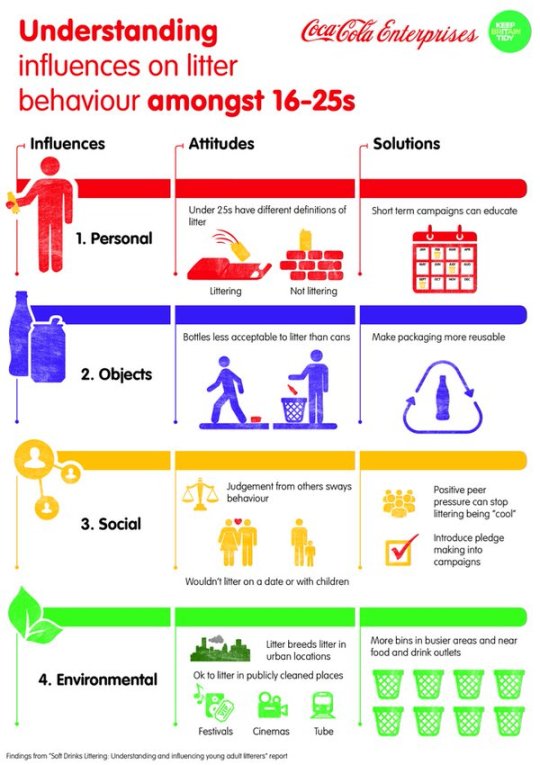I argue in my rubbish manifesto that we need to understand the reasoning behind the behaviour of the people doing the littering if we want to have any hope of changing things. Boiling it down to “They’re lazy” or “They’re selfish” prevents us from seeing what may actually be going on (even if there is a rather large kernel of truth behind those statements!).
So I was very pleased to see this diagram pop up in my Twitter feed the other day because these insights support some suspicions I’ve had about littering. However, for them to be truly useful they must now be acted upon. Do we have the “cool” kids or pop culture figures speak out against littering to capitalise on peer pressure? Make an awareness campaign, e.g. “It’s still litter” and show rubbish in the most unlikely of places? Encourage people to clean up after themselves in public places to help the habit become more ingrained? Regardless, we must have action behind these ideas and insights if we actually want to get anything accomplished.

On a related note, I was less pleased to see one of these points in action recently, especially in someone who was a good decade or two beyond the 16-25 year age bracket. On Thursday morning, the 6:58am London-bound train was cancelled, leaving everyone heading east from the Chippenham railway station to wait for the 7:25am. This was more time to finish off early-morning beverages … which I witnessed someone do, then walk over and set the empty coffee cup on a bench.
So much is revealed in this behavioural choice. First, I am convinced that he did not view his actions as littering. “Littering” has the connotation of deliberately throwing something to the ground, but this was “putting” or “placing” or some other verb. Why I think this is the case is that he was with a group of co-workers, on a crowded platform: his behaviour was very much on display. Second, it is further evidence that people want rid of products once they’re finished with them; carrying something that is empty or no longer needed just isn’t done. Since there was no bin in view, he placed it on the closest available surface. His co-workers did not comment on his behaviour, but they did keep hold of their own cups, hopefully to dispose of in the bins on the train.
Another descriptor that tends to be bandied about with regard to litterers is “thoughtless”. And indeed, this particular behaviour shows a lack of forethought: how long will the cup stay on the bench before getting knocked to the ground? What example does this set at the station (after all, litter attracts litter)? And someone will have to pick it up: why should it be their responsibility and not the person who purchased the product in the first place? Perhaps this is one way it could be approached: make people think about the effects of their actions.
Finally, I recognise that I played a role in this situation by not saying anything when I witnessed it. By not speaking out against it, we as a society implicitly give approval to such behaviour. I am certainly going to try harder to speak up the next time I see littering behaviour – and remember to check the status of my train before leaving the house.
